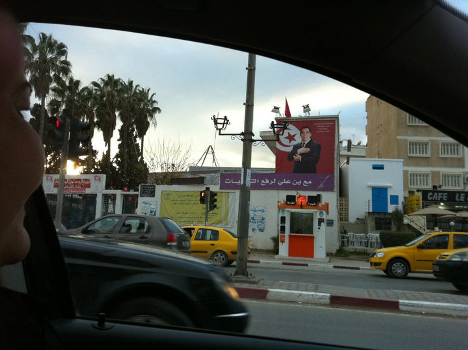I arrived in Tunis on January 1, only a few days after a wave of rallies had erupted due to the suicide of an unemployed college graduate, who torched himself after police confiscated his fruit cart, cutting off his only source of income. Mohammed Bouazizi, 26, sold fruit and vegetables without the necessary vendor's permit in the town of Sidi Bouzid, located 160 miles from the country's capital Tunis.
At the time, Tunisians had been protesting for a couple of weeks over poor living conditions, high unemployment, government corruption and repression. Three people had been killed in the protests by the time of my arrival. The atmosphere was tense, public protests were rare in Tunisia where dissent was usually repressed; however, no one I spoke to in Tunis believed then that these demonstrations would lead to the ouster of President Zein El Abidine Ben Ali who eventually fled the country to Saudi Arabia after ruling Tunisia for 23 years.

The Jasmine Revolution, as it is dubbed now, was not televised on Tunisia's main television station, Tunisie7, nor did it make headlines in the local press, but the news spread like wildfire on Facebook, YouTube, mobile phone, and to a lesser extent on Twitter (most of the tweets were from outside Tunisia).
Prior to my arrival to Tunis, I had spent the past five weeks in the UAE, Qatar, Egypt, Jordan, Lebanon, and the Palestinian Territories debating social media, its impact on youth, and its relationship with journalism in the Arab world with my interlocutors.
It is very easy, but over-simplistic and naive to decide on a social media interpretation for the Jasmine Revolution, as we have been witnessing by many bloggers and self-appointed Middle East experts, many of whom neither speak Arabic nor have spent an extended period of time in the Middle East. They desperately want to convince us that Tunisians needed an external technological Western invention in order to succeed. A Twitter revolution of some sorts, as they previously labeled the Iranian Velvet Revolution, as though Arab masses were not capable on their own of saying "enough is enough."
Certainly social media was used as a communication tool for Tunisians to air their frustrations with the economy, unemployment, censorship, and corruption. But many factors lead to its success, such as a well organized trade unions movement, and the most potent weapon in the Arab world, the youth.
Population ageing is widespread across the world, but most Arab countries have been experiencing a youth explosion. More than one third of them are now unemployed. Tunisia is a bit different since it is one of the few Arab countries that opted for a family planning policy initiated during the rule of its first president, Habib Bourguiba. Tunisia, however, has also adopted a development plan with a focus on higher education, leaving a large number of young college graduates unemployed.
When I was driving around in Tunis, posters of President Zein El Abidine Ben Ali were sprinkled throughout the city with the slogan, "Together We Meet Challenges," a slogan meant to tout his plan of development by focusing on job creation, increasing revenue and enhancing Tunisia's positioning and influence on the regional and international scales. This obviously has failed, leaving a country of over- educated youth, many of whom are unemployed or doing menial jobs. Mohammed Bouazizi was the catalyst for their revolution.
Today, millions of Arab youth are disenchanted with politics and live a dramatic rupture with the state. Restrictions on freedom of expression, though improving in several countries, dominate the mass media in the Arab world. Social media has in many instances opened the door for them not only to share ideas, but also to take action. We've seen a vivid example of this during the Jeddah floods when the Saudi government tried to suppress the news about the devastation caused by nature due to poor infrastructure in the Arab world's richest country, but the news quickly spread on Facebook and the internet by concerned young Saudis. We've witnessed a bread revolution in Egypt, also driven by high unemployment and poverty; again initially transmitted to the outside world by young bloggers before it became international headlines.
Throughout history, when social discontent can no longer be contained, people have taken to the street to demand change. Having the most rudimentary technology, or none at all have not prevented these movements, a case in point being hand printed pamphlets distributed prior to the French Revolution, Gandhi's ability to inspire and mobilize through the exponential power of word of mouth, and the leaflets and tape recordings of Ayatollah Ruhollah Khomeini speeches that were smuggled into the country prior to the Iranian Revolution.
Mohammed Bouazizi's self immolation was the expression not only of his despair, but that of youth throughout Tunisia ready to explode. Although they are an educated tech-savvy generation who were able to use social media as a tool, the underlying force was not a byproduct of this and the current situation would have come to pass with or without it.
Crediting social media with these revolutions however, trivializes them and does a disservice to the deep rooted issues that cause them.
As I was leaving Tunis on January 4, news spread again like wildfire of Mohammed Bouazizi's death at a hospital in the town of Ben Arous. Today, Mohsen Bouterfif died. Mohsen doused himself in gasoline and set himself on fire on Thursday after a meeting with the mayor of the small city of Boukhadra who was unable to provide him with a job and housing. Boukhadra is in Algeria.
